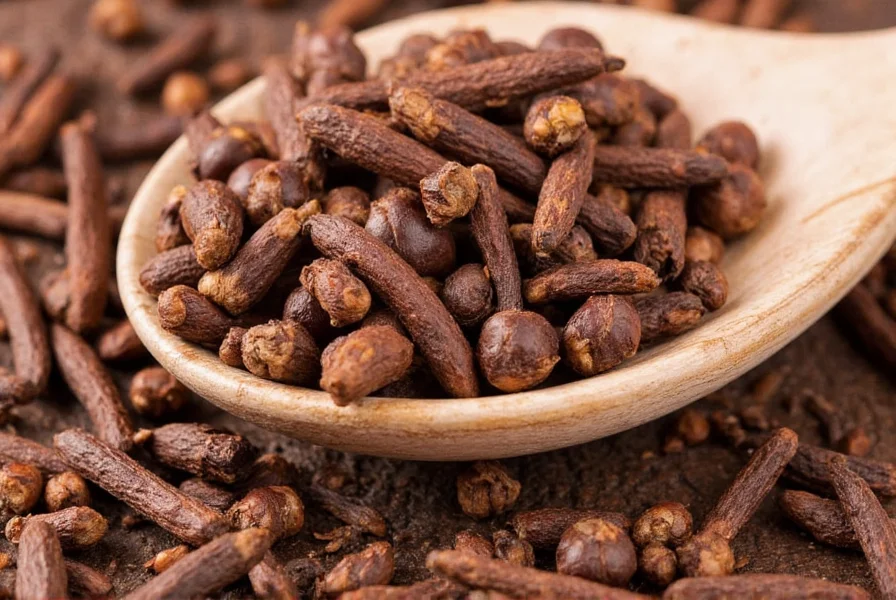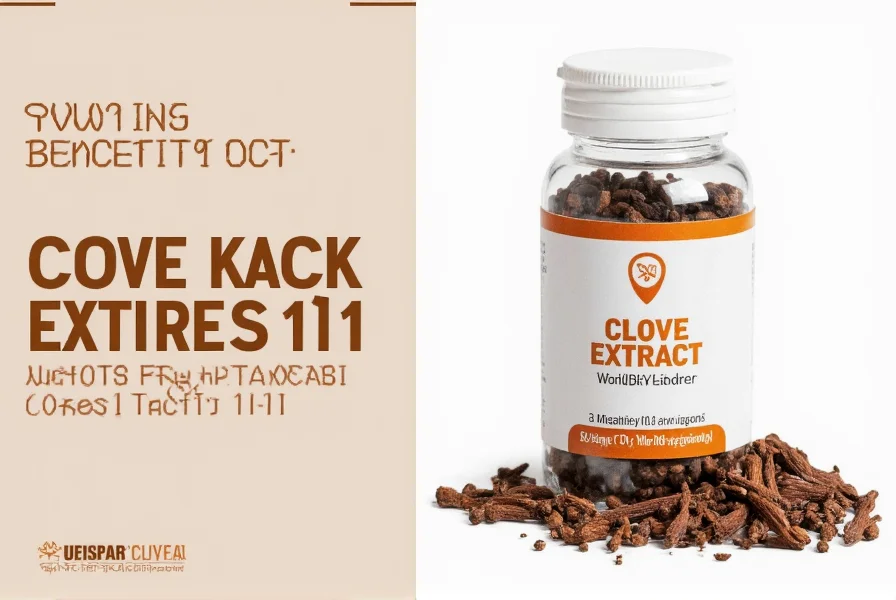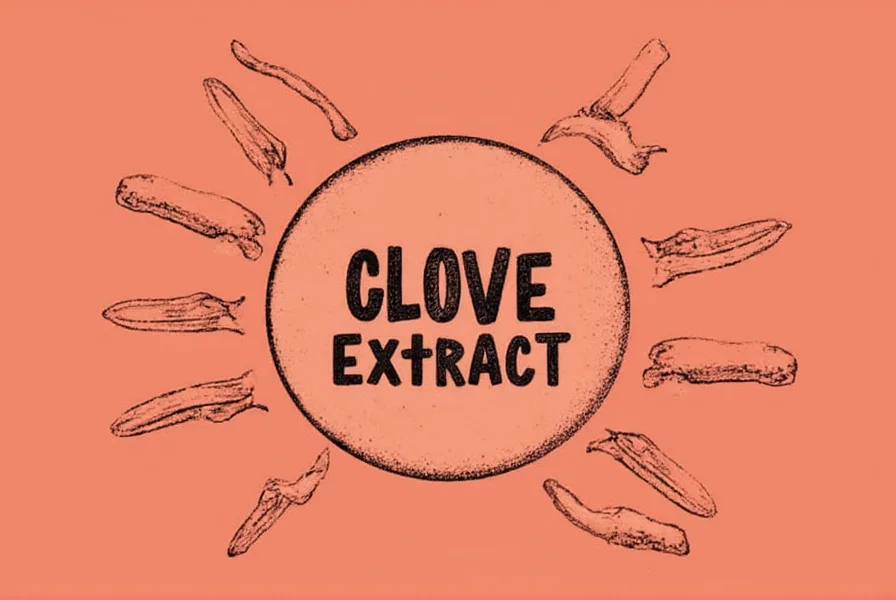For centuries, traditional medicine systems across Asia and the Middle East have utilized clove extract for its potent therapeutic properties. Modern scientific analysis reveals that this powerful botanical concentrate contains approximately 70-90% eugenol, the compound responsible for most of its biological activity. Understanding the evidence-based applications and proper usage guidelines is essential for safely incorporating clove extract into your wellness routine.
What Exactly Is Clove Extract?
Clove extract represents a concentrated form of the essential oil derived from Syzygium aromaticum flower buds, commonly known as cloves. The extraction process typically involves steam distillation, which preserves the volatile compounds that give cloves their distinctive properties. Unlike whole cloves or ground powder, the extract delivers a significantly higher concentration of active components, particularly eugenol.
When evaluating natural clove extract versus synthetic alternatives, quality matters significantly. Authentic clove extract should list Syzygium aromaticum as the sole ingredient without fillers or artificial additives. The highest quality extracts maintain the full spectrum of naturally occurring compounds rather than isolating eugenol alone, preserving the synergistic effects observed in research studies.

Scientifically Validated Health Benefits
Multiple peer-reviewed studies have investigated the therapeutic potential of clove extract, particularly focusing on its primary component, eugenol. Research published in the Journal of Dentistry confirms that clove extract benefits for dental health include temporary relief from toothaches through its local anesthetic and antiseptic properties. Dental professionals sometimes recommend diluted clove oil as a short-term solution for pain management before appointments.
The antimicrobial properties of clove extract have been extensively documented. A 2020 study in BMC Complementary Medicine and Therapies demonstrated effectiveness against various bacteria and fungi, including some strains resistant to conventional treatments. This explains why traditional medicine systems have long used clove for oral health and wound care applications.
| Active Compound | Concentration in Extract | Primary Biological Effects |
|---|---|---|
| Eugenol | 70-90% | Antimicrobial, analgesic, anti-inflammatory |
| Beta-caryophyllene | 5-15% | Anti-inflammatory, antioxidant |
| Eugenyl acetate | 2-10% | Pain relief, antimicrobial |
Traditional Uses vs. Scientific Evidence
While traditional medicine has attributed numerous benefits to clove extract, modern research provides a more nuanced understanding. For example, historical use for digestive issues shows some scientific support, with studies indicating potential benefits for reducing nausea and improving digestion through stimulation of digestive enzymes.
However, claims about clove extract for blood sugar regulation remain largely theoretical. Animal studies show promising results, but human clinical trials are limited. Similarly, while traditional systems use clove for respiratory conditions, scientific evidence primarily supports its antimicrobial action rather than direct respiratory benefits.
Safe Application Guidelines
Proper usage is critical when working with concentrated botanical extracts. For how to use clove oil extract safely, always follow these evidence-based guidelines:
- Dilute properly: Use a 1:10 ratio (1 part clove extract to 9 parts carrier oil like coconut or olive oil) for topical applications
- Perform patch testing: Apply diluted extract to a small skin area and wait 24 hours before broader use
- Limited duration: Use for no more than 7 consecutive days for dental applications
- Avoid mucous membranes: Never apply undiluted extract directly to gums or口腔 tissues
For dental applications specifically, dentists recommend applying a single drop of properly diluted extract to a cotton ball and placing it near the affected tooth for no more than 30 minutes at a time. Exceeding these guidelines increases the risk of clove extract side effects including tissue damage and chemical burns.

Important Safety Considerations
Despite its natural origin, clove extract requires careful handling. The American Dental Association warns that undiluted application can cause oral mucosal damage, including burns, ulcers, and tissue necrosis. Children under 2 should never use clove extract due to choking hazards and potential toxicity.
Pregnant and breastfeeding women should consult healthcare providers before use, as eugenol can affect blood clotting. Individuals taking blood thinners, diabetes medications, or seizure medications should exercise caution due to potential interactions. Always store clove extract out of reach of children, as ingestion of even small amounts (5-10 mL) can cause serious toxicity.
Quality Selection Criteria
When choosing a product, look for these indicators of high quality clove extract:
- 100% pure Syzygium aromaticum without additives
- Dark glass packaging to protect from light degradation
- Evidence of third-party testing for purity and potency
- Clear labeling of eugenol content percentage
- Organic certification when possible
Avoid products that make medical claims beyond temporary pain relief or antimicrobial effects, as these often indicate questionable quality or misleading marketing. Reputable manufacturers provide batch-specific testing results upon request.
Comparing Clove Forms for Specific Applications
Understanding when to use clove extract versus other clove preparations helps maximize benefits while minimizing risks:
- For immediate dental pain relief: Diluted extract provides faster, more targeted relief than whole cloves
- For cooking applications: Ground cloves offer better flavor control than extract
- For antimicrobial surface cleaning: Properly diluted extract works better than whole cloves
- For long-term storage: Extract maintains potency longer than ground cloves
Frequently Asked Questions
Can clove extract cure a tooth infection?
No, clove extract cannot cure a tooth infection. While it may provide temporary pain relief due to its analgesic properties, it doesn't eliminate the bacterial infection causing the problem. Dental infections require professional treatment with antibiotics and dental procedures. Using clove extract should only be a short-term measure until you can see a dentist.
How do I dilute clove extract for safe use?
For safe topical use, dilute clove extract at a 1:10 ratio (one part extract to ten parts carrier oil like coconut, olive, or almond oil). For dental applications, some dentists recommend a slightly stronger 1:5 dilution, but never apply undiluted extract directly to skin or oral tissues. Always perform a patch test 24 hours before broader application.
Is clove extract safe for children's toothaches?
Clove extract is not recommended for children under 2 years old due to toxicity risks. For older children, use extreme caution and only with pediatrician approval. If used, dilute more than for adults (1:20 ratio) and apply for no more than 15 minutes. Many pediatric dentists recommend safer alternatives like children's pain relievers or cold compresses instead of clove extract.
How long does clove extract remain effective after opening?
Properly stored clove extract (in dark glass, away from heat and light) typically remains effective for 1-2 years after opening. Signs of degradation include color changes (darkening), separation of components, or diminished aroma. To maximize shelf life, store in a cool, dark place and ensure the cap is tightly sealed after each use.











 浙公网安备
33010002000092号
浙公网安备
33010002000092号 浙B2-20120091-4
浙B2-20120091-4